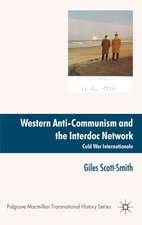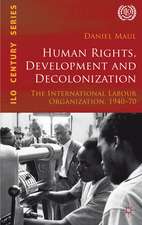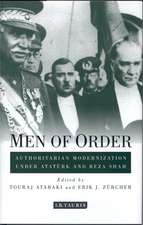Transnational Socialist Networks in the 1970s: European Community Development Aid and Southern Enlargement: Palgrave Studies in the History of Social Movements
Autor Christian Salmen Limba Engleză Hardback – 6 ian 2016
| Toate formatele și edițiile | Preț | Express |
|---|---|---|
| Paperback (1) | 384.09 lei 6-8 săpt. | |
| Palgrave Macmillan UK – 29 mar 2018 | 384.09 lei 6-8 săpt. | |
| Hardback (1) | 390.25 lei 6-8 săpt. | |
| Palgrave Macmillan UK – 6 ian 2016 | 390.25 lei 6-8 săpt. |
Din seria Palgrave Studies in the History of Social Movements
- 18%
 Preț: 783.98 lei
Preț: 783.98 lei - 9%
 Preț: 833.83 lei
Preț: 833.83 lei -
 Preț: 425.20 lei
Preț: 425.20 lei -
 Preț: 385.08 lei
Preț: 385.08 lei - 18%
 Preț: 790.28 lei
Preț: 790.28 lei - 15%
 Preț: 583.93 lei
Preț: 583.93 lei - 18%
 Preț: 737.12 lei
Preț: 737.12 lei - 15%
 Preț: 698.30 lei
Preț: 698.30 lei -
 Preț: 414.80 lei
Preț: 414.80 lei -
 Preț: 385.25 lei
Preț: 385.25 lei -
 Preț: 418.45 lei
Preț: 418.45 lei - 15%
 Preț: 590.63 lei
Preț: 590.63 lei - 18%
 Preț: 896.84 lei
Preț: 896.84 lei - 18%
 Preț: 735.38 lei
Preț: 735.38 lei - 18%
 Preț: 782.87 lei
Preț: 782.87 lei -
 Preț: 384.48 lei
Preț: 384.48 lei -
 Preț: 384.09 lei
Preț: 384.09 lei - 18%
 Preț: 953.03 lei
Preț: 953.03 lei - 18%
 Preț: 731.28 lei
Preț: 731.28 lei -
 Preț: 483.70 lei
Preț: 483.70 lei - 18%
 Preț: 786.04 lei
Preț: 786.04 lei -
 Preț: 451.10 lei
Preț: 451.10 lei - 15%
 Preț: 592.12 lei
Preț: 592.12 lei - 15%
 Preț: 580.49 lei
Preț: 580.49 lei - 18%
 Preț: 791.57 lei
Preț: 791.57 lei - 15%
 Preț: 710.42 lei
Preț: 710.42 lei - 18%
 Preț: 736.32 lei
Preț: 736.32 lei -
 Preț: 484.69 lei
Preț: 484.69 lei - 15%
 Preț: 705.34 lei
Preț: 705.34 lei - 18%
 Preț: 729.36 lei
Preț: 729.36 lei -
 Preț: 384.86 lei
Preț: 384.86 lei - 18%
 Preț: 954.77 lei
Preț: 954.77 lei - 15%
 Preț: 712.87 lei
Preț: 712.87 lei -
 Preț: 455.71 lei
Preț: 455.71 lei - 9%
 Preț: 700.32 lei
Preț: 700.32 lei -
 Preț: 391.61 lei
Preț: 391.61 lei
Preț: 390.25 lei
Nou
Puncte Express: 585
Preț estimativ în valută:
74.67€ • 77.97$ • 61.66£
74.67€ • 77.97$ • 61.66£
Carte tipărită la comandă
Livrare economică 15-29 aprilie
Preluare comenzi: 021 569.72.76
Specificații
ISBN-13: 9781137551191
ISBN-10: 1137551194
Pagini: 256
Ilustrații: XVII, 256 p.
Dimensiuni: 140 x 216 x 18 mm
Greutate: 0.47 kg
Ediția:1st ed. 2016
Editura: Palgrave Macmillan UK
Colecția Palgrave Macmillan
Seria Palgrave Studies in the History of Social Movements
Locul publicării:London, United Kingdom
ISBN-10: 1137551194
Pagini: 256
Ilustrații: XVII, 256 p.
Dimensiuni: 140 x 216 x 18 mm
Greutate: 0.47 kg
Ediția:1st ed. 2016
Editura: Palgrave Macmillan UK
Colecția Palgrave Macmillan
Seria Palgrave Studies in the History of Social Movements
Locul publicării:London, United Kingdom
Cuprins
Contents
1. Formal Weakness And Informal Strength? Transnational Socialist Party Cooperation In European Integration
2. Shaping EC Development Aid Policy
3. Facilitating EC Southern Enlargement Policy
4. Comparative Assessment: Structures, Actors, Functions And Impact
1. Formal Weakness And Informal Strength? Transnational Socialist Party Cooperation In European Integration
2. Shaping EC Development Aid Policy
3. Facilitating EC Southern Enlargement Policy
4. Comparative Assessment: Structures, Actors, Functions And Impact
Recenzii
“In this book of four chapters, an introduction and a conclusion, Christian Salm sets out to reconstruct how transnational socialist networks operated and influenced politics. … this is a worthwhile and informative addition to the literature on international socialist cooperation.” (David Redvaldsen, European History Quarterly, Vol. 47 (1), 2017)
Notă biografică
Christian Salm was Doctoral Researcher at the Centre for European and International Studies Research at the University of Portsmouth, UK, and Postdoctoral Researcher at the Institute for Social Movements at the Ruhr-University Bochum, Germany. He is a policy analyst at the European Parliamentary Research Service in Brussels, Belgium, since 2015.
Textul de pe ultima copertă
Transnational Socialist Networks in the 1970s argues that western European socialist parties' transnational cooperation across national borders significantly influenced politics and policy-making in what was the European Communities (EC). It focuses on the network-like informal structures that characterised transnational cooperation between the party members and leaders of different socialist parties involved in European affairs. Taking the example of two case studies, namely EC development aid policy and EC southern enlargement policy, the book demonstrates that the socialist parties strengthened their informal transnational network structures for the purposes of debating ideological and programmatic issues and finding policy solutions to common challenges in both policy fields. Moreover, it shows that the networks developed various functions to influence European governance. Against this background, the analysis in this book makes not only a significant contribution to the study of transnational networks of western European socialist parties and the history of European integration, but also adds to the understanding of the role of transnational networks in European politics and policy-making.













